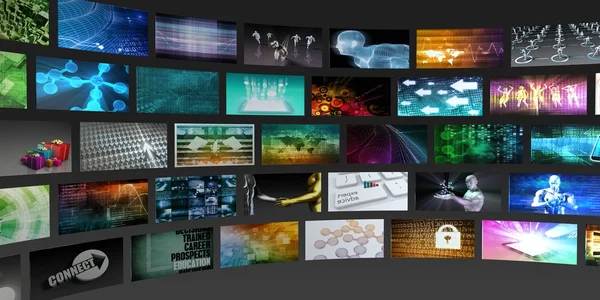
Image Source: DepositPhotos
The evolution of digital entertainment continues to be driven by transformative technological investments that redefine how people create, distribute, and experience content. Advances in immersive technologies, artificial intelligence, and cloud computing are playing significant roles in shaping the landscape. Each of these innovations is not only expanding possibilities but also addressing the diverse preferences and behaviors of audiences.
Immersive Technologies and Their Expanding Applications
Virtual Reality (VR), Augmented Reality (AR), and Mixed Reality (MR) have progressed beyond conceptual stages to become integral components of modern entertainment. These technologies are increasingly employed to create interactive, lifelike experiences across various mediums. In gaming, VR platforms such as Meta’s Horizon Worlds and PlayStation VR are providing users with dynamic virtual environments.
Similarly, AR is enhancing live events by overlaying digital elements onto physical spaces, enriching viewer experiences. The film industry has also started exploring the potential of VR for immersive storytelling, enabling audiences to engage more deeply with narratives. As these technologies mature, their adoption is expected to extend further, creating entertainment experiences that are more personalized and interactive.
AI as a Catalyst for Personalization and Creativity
Artificial intelligence is reshaping entertainment by facilitating deeper personalization and augmenting creative processes. AI is being widely utilized in video game development, where machine learning algorithms create adaptive gameplay experiences tailored to individual player styles. For instance, AI-driven NPCs (non-player characters) now exhibit more realistic behaviors, enhancing immersion and player interaction.
Beyond consumption, AI is also influencing content creation through tools like Tad AI, which assist in generating music, writing scripts, and creating visual art. By combining predictive analytics with creative innovation, AI is fostering a democratized approach to storytelling. This convergence of technology and entertainment not only diversifies content offerings but also enhances engagement by aligning closely with user interests.
The Enduring Appeal of Short-Form Content
Short-form content has emerged as a defining feature of the digital entertainment era, driven by platforms like TikTok, Instagram Reels, and YouTube Shorts. These services cater to shifting consumption patterns by offering easily shareable, concise video formats. The brevity and adaptability of short-form content allow creators to experiment with diverse ideas, contributing to viral trends and cultural movements.
This shift has also influenced traditional entertainment sectors, encouraging the development of concise, impactful storytelling. As the popularity of short-form content continues to rise, its impact on audience engagement and content strategies will likely remain significant.
Online Entertainment: A Snapshot of Popularity
Online entertainment extends beyond gaming to include streaming platforms that have transformed how audiences consume media. Services like Netflix, YouTube, and Spotify deliver vast libraries of content on demand, catering to diverse tastes and preferences. These platforms leverage advancements in AI and cloud technology to offer seamless user experiences, personalized recommendations, and high-quality streaming.
Online games have consistently been a cornerstone of digital entertainment, evolving in both complexity and variety. Platforms like Gamesville.com, established in 1996, exemplify the sustained appeal of online gaming. Offering a broad spectrum of options, from strategic card games like Dragon Tiger to thought-provoking puzzles like Wordler and interactive casino games like Sweet Bonanza, Gameswille reflects the diverse tastes of global audiences. The platform’s extensive catalog and consistent updates have enabled it to remain relevant in a competitive environment.
The Role of Cloud Technology in Accessibility
Cloud technology is transforming accessibility in the entertainment industry by minimizing the reliance on advanced hardware. Platforms like Nvidia GeForce Now and Microsoft’s Xbox Cloud Gaming enable users to stream games directly to their devices, bypassing the requirement for expensive, high-performance gaming systems. This approach makes gaming more inclusive, allowing a wider audience to engage without substantial upfront costs.
In addition, cloud-based music production tools have transformed how artists create and collaborate. Platforms like Splice enable musicians to access vast libraries of sounds, collaborate in real time, and produce high-quality tracks from virtually anywhere. These advancements underscore how cloud technology is reshaping the creative process and making professional-grade tools more accessible to a global audience.
Shaping the Future of Entertainment
The future of digital entertainment is being shaped by technological innovations that emphasize immersion, accessibility, and personalization. Investments in immersive technologies, AI, and cloud computing are revolutionizing how content is created and experienced. These advancements not only redefine the boundaries of entertainment but also address the evolving expectations of global audiences. As these technologies continue to develop, they promise to influence the industry in profound and enduring ways.



